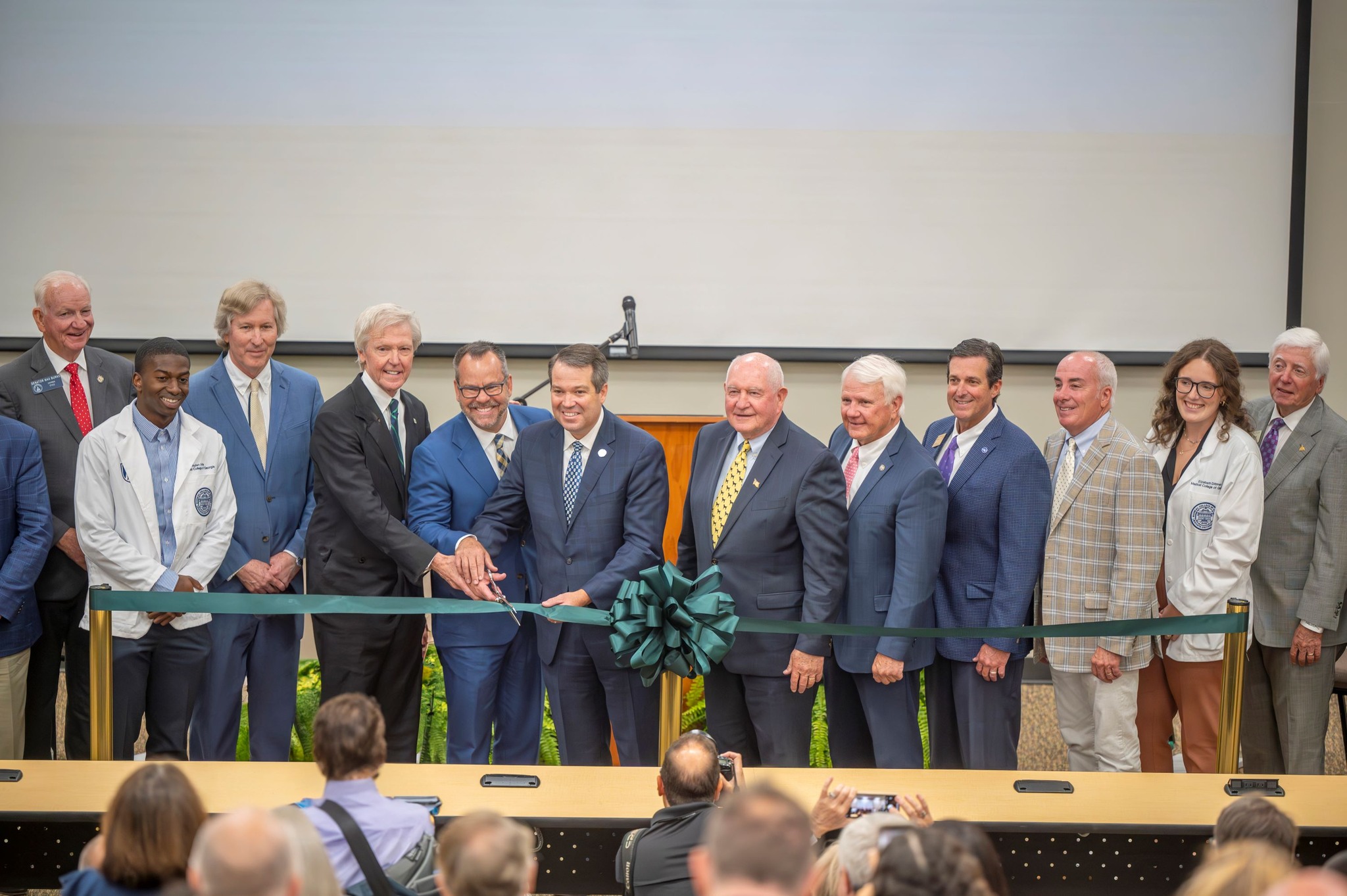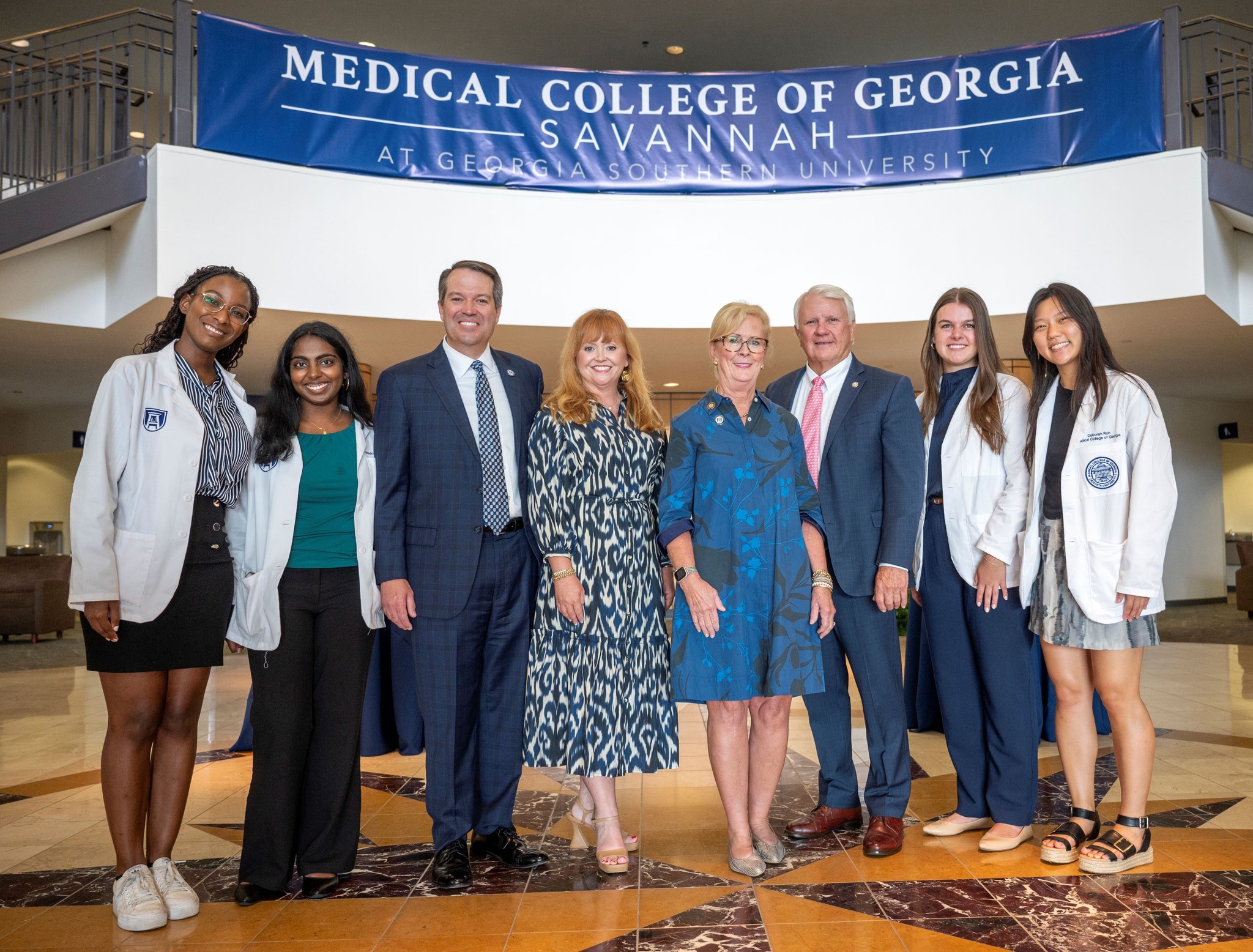Augusta University opens new Medical College of Georgia campus in Savannah
Aug 5, 2024
Doubling the number of medical students who can be trained in the southeastern part of the state, Augusta University recently opened its new Medical College of Georgia Savannah campus at Georgia Southern University.
MCG, which had been sending third- and fourth-year medical students to the Savannah area for clinical rotations and training since 2007, is welcoming 41 first-year medical students who will complete their entire four-year journey at the new campus.
On July 26, leadership, faculty, staff, students and alumni from AU, MCG and Georgia Southern, as well as elected officials and other community supporters, gathered to celebrate the official ribbon-cutting ceremony.

“This campus expansion builds on our long-standing commitment as the state’s flagship medical school to produce the best-trained doctors for Georgia,” said Augusta University President Russell T. Keen, EdD. “Through this collaboration with Georgia Southern University, we are forging a brighter future for health care in Georgia. I extend my deepest gratitude to all those who have championed this vision, including Governor Kemp, the Georgia Legislature, Speaker of the House Jon Burns, Chancellor Sonny Perdue and the Board of Regents of the University System of Georgia.”
Expanding opportunities for students
The new Savannah campus is MCG’s third four-year campus and will allow Georgia’s flagship public medical school to break into the top five in the nation for medical schools by class size, increasing enrollment from 264 students per class to 304.
“MCG has a nearly 200-year tradition of producing great doctors and great medicine, and this marks an important milestone in that history,” said David C. Hess, MD, dean of the Medical College of Georgia. “This new campus would not be possible without the continued partnership and support of St. Joseph’s/Candler Health System, which has been clinically educating our students in Savannah for the past 17 years, or this new collaboration with Georgia Southern. I am confident that both will continue to grow as we expand MCG’s footprint in Southeast Georgia.”
The impact of the increase in class size is already being felt by medical students like Lizzie Dittmer and Brian Egan.
Dittmer grew up in Savannah and has been waiting for this moment for three years after graduating from Georgia Southern in 2021.
“Being from Georgia and wanting to stay in Georgia, it’s a very good opportunity; but MCG is also focused on placing providers into Georgia’s counties and towns, especially those in rural areas,” said Dittmer. “Another big pull for me is that I’m from here, and I already know some of the doctors on faculty, like my pediatrician, Dr. William Webb. He’s one of our instructors here, and it’s a really cool opportunity to learn from people I’ve known my whole life while also staying involved and getting to serve in the community I grew up in.”
Egan’s experience has been similar to Dittmer’s. The Savannah native and 2023 University of Georgia graduate took a gap year to add experience to his medical school application after not being admitted on his first try.
“Obviously, everyone wants to get in the first go-round, but I took my gap year and did a lot of community health work, and it just so happened the Savannah Campus was opening the next cycle,” said Egan. “It’s always been a dream of mine to go to MCG, but being able to do so in my home city and to give back is a dream come true. The stars aligned and I’m so grateful for the opportunity to be a part of this first class.”
Expanding collaborations
In support of the new campus, Georgia Southern is providing approximately 23,000 square feet of instructional and lab space in its Armstrong Center and the Waters College of Health Professions Academic Building. This includes 10,000 square feet of dedicated student group workspace and faculty and staff offices, and 13,000 square feet of shared anatomy lab and large classroom space.

“Georgia Southern University is very proud to host MCG Savannah at Georgia Southern, producing even more doctors and medical practitioners that are desperately needed in our region and our state. Together, we are solving and evolving to meet the needs of a growing state, soaring beyond all expectations,” said Georgia Southern President Kyle Marrero, DMA. “While these doctors will graduate with degrees from Augusta University’s Medical College of Georgia, Georgia Southern will not only provide state-of-the-art facilities for their training, but will create a pipeline for our students to be competitive candidates for future classes of MCG students – and, most importantly, stay in the state of Georgia. Our collaboration will advance training for both Georgia Southern and MCG students by incorporating medical students and future physicians into our interdisciplinary healthcare team simulations — an approach that has been shown to improve the delivery of care and patient outcomes.”
In May, the Board of Regents of the University System of Georgia approved $1.7 million for renovations to Georgia Southern University’s Armstrong Campus in Savannah to establish the new campus. The renovations included the creation of a new anatomy lab within the Health Professions Building, as well as minor renovations and new furniture, fixtures and equipment for the student group workspace and faculty and staff offices.
“This is a great day for the state of Georgia, and particularly for Southeast Georgia. This campus is not only a regional collaboration but also a great statewide collaboration,” said USG Chancellor Sonny Perdue. “I want to thank Governor Kemp for recommending the funding for these types of projects, as well as Speaker Burns, our entire General Assembly and our Board of Regents for recognizing the need here. We know we have the best quality of medical students and graduates, we just haven’t had enough. We are a growing state, and we want to ensure quality health care throughout the state.”
In 2011, MCG established a two-year regional clinical campus in the area when the first group of seven third- and fourth-year residential students, affectionately known as the “Southeast Seven,” moved to the area full-time. In the four years prior, students performed 4- to 6-week clinical rotations at St. Joseph’s/Candler Health System in Savannah. Brunswick’s Southeast Georgia Health System was added to the fold in 2010.
MCG’s statewide educational model also has students learning at two-year, clinically-focused regional campuses in every corner of the state, including the Southwest Campus in Albany and the Northwest Campus in Rome and Dalton.
“The completion of the Medical College of Georgia’s new four-year campus in Savannah marks a critical milestone for the future of access to quality, affordable health care throughout our state,” said Speaker of the House Jon Burns. “We’re grateful to Augusta University and the Medical College of Georgia, Georgia Southern University, Gov. Kemp and the entire General Assembly for their dedication to this project – and look forward to the tremendous impact the physicians educated on this campus will have across Georgia.”
Expanding MCG’s impact in underserved areas
According to the Association of American Medical Colleges, roughly 57% of medical residents who completed residency training from 2011-20 remained in the state where they completed their residencies and either joined practices or established their own.
That was the case for 2015 MCG graduate Santosh Reddy, MD, a general surgeon at Metro Surgical, which serves Savanah, Rincon, Pooler, Richmond Hill, Sylvania, Jesup and Bluffton. The practice was co-founded by MCG alumnus Mark Blankenship, MD, and John W. Odom, MD, who has served as an instructor for MCG’s Southeast Clinical Campus since its inception. A third MCG alumnus, Russell C. Kirks, MD, who was a member of the “Southeast Seven,” is also a partner in the practice.
“I spent my last two years here in Savannah, and I made really good connections, particularly with my surgery attendings who became mentors,” said Reddy. “I always tell people that I remember when I left medical school, I just wanted to go back to Savannah to continue to work with the community that helped teach me and gave me the foundation for what it is to be a doctor.”
For Reddy, who was a member of the third graduating class through the Southeast Clinical Campus after it achieved residential status, the new four-year Savannah campus is part of the natural progression for his alma mater to continue to serve the entire state of Georgia.
“It’s expanding the footprint of the Medical College of Georgia a little bit more,” he said. “That means we will have more doctors across the state, particularly in areas where they are needed, and it helps medical students by offering a different setting than Augusta because some of us need and want those different experiences. I think it’s a good step in the right direction.”